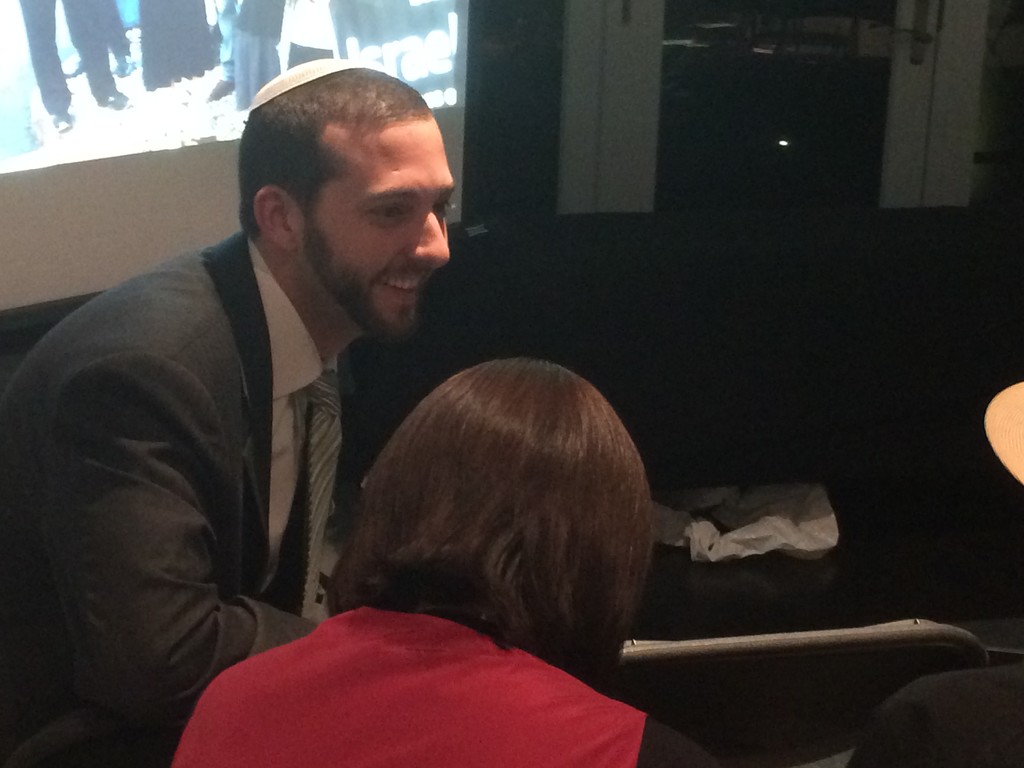Woodmere turns out to aid agunot
Rabbi Hershel Billet discussed how to appropriately encourage a recalcitrant spouse to deliver a get, and voiced support for the Organization for the Resolution of Agunot (ORA), at a parlor meeting in Woodmere on motzei Shabbat.
“Halacha says that when a marriage is over you’re supposed to give a get — it’s very simple,” he said. “Fight in civil court all you want, but the Jewish responsibility is to give the get.”
Billet, rav of the Young Israel of Woodmere, told about 75 community members, at the home of Rachel and Marc Fries, that to do otherwise is not “legal halachic abuse,” but rather “counter to halacha.”
A get should be given “unconditionally and in a timely fashion,” said ORA Executive Director Rabbi Jeremy Stern. “There should be no strings attached and there should be no delay. Once the marriage is irreconcilable and there is no chance for shalom bais there is no excuse for the get not to be given.”
Stern said ORA has helped resolve 220 aguna cases in the 12 years since it was founded by students at Yeshiva University. In the last 12 months, its eight staff members and numerous volunteers fielded 162 calls, and at any given time they are actively involved in around 50 cases, he said.
If mediation fails, ORA will use “all halachically acceptable and civilly legal forms of pressure” to facilitate delivery of a get.
The group is also engaged in an educational process.
‘They don’t teach how to get divorced in yeshiva high school and Bais Yaacov,” Stern said, so last year ORA took its message to 3,000 students.
“Once we standardize the use of the halachic prenup, we can eradicate this problem from our community,” he said.
Michelle Greenberg-Korbin, dean of students at Columbia University, ORA’s first legal adviser and now a member of ORA’s board, said that halacha does not “allow someone to be naval birshut hatorah, to use something that is halachic “to torture another human being.”
“It’s very difficult to see halachic Jews not act the way we would hope they would act,” she said. “All ORA wants is the get to be given. If you want to fight, gay gezunta heit (live and be well), but the get has to be given.”
ORA wants people to view the refusal of a recalcitrant spouse to deliver a get as a form of domestic abuse.
Greenberg-Korbin said this “is usually the end of a series of abusive acts — emotional or verbal or physical — that caused the marriage to come to an end.”
“When an abuse victim is ready to stand up and walk away” and rebuild her life, the refusal to give a get means the victim cannot walk away, she said.
She called this an issue of tzedek (social justice), pointing out that the neviim had warned that the Jewish nation would be judged on how it protects its most vulnerable — in this case, its agunot (chained women).
Rabbeinu Tam justified the imposition of serious social sanctions against recalcitrant spouses, Rabbi Billet said.
In addition to having couples sign halachically-valid pre-nuptial agreements, some shuls — including YI Woodmere — have added recalcitrant spouse clauses to their bylaws, he said.
“Of course, it only works if the husband comes to shul and is part of the community,” Rabbi Billet continued.
“But when someone “cares about his good name, wants to be able to daven for the amud when he has a yahrzeit, wants to able to get an aliyah, wants to be able to celebrate certain occasions in the shul — he will be denied all of those things and he can’t come to the rabbi or the president and say I’m the biggest giver to the shul and you can’t do this to me, because it is in the shul bylaws.”
While this rule has already helped at least one member of the community, Rabbi Billet conceded that there are instances when the influence of a rabbi and his shul is limited, and that’s where ORA comes in.
“If you’re an Orthodox rabbi you can only play within the bounds of the basketball court, you can’t go out of bounds. Once you go out of bounds you’re no longer in the game,” he said.
He recounted that ORA helped a woman receive a get from an ex-husband who had a business in town. “He understood there would be demonstrations and there would be consequences for him,” he said.
“ORA does it well. They are idealistic, they are caring, they are menchlich. ORA is exactly what it says — it is a light in a very dark place.”
“The Torah’s law is not an inhumane law,” Rabbi Billet concluded. “What is inhumane are people who abuse the rule.
“Torah’s law is that the man has to give the get to the woman.”
Naomi, married just four months, was one of two women aided by ORA who told their stories on Saturday night.
The community in which Naomi and her husband resided did nothing to help her, she said. “I was a temporary problem [to them, while my] ex and his family was part of the community.”
“The community had the power to influence him but didn’t,” Naomi said, adding that her hopelessness abated after she reached out to ORA. Through ORA she learned that her husband had also refused a get to his first wife until pressured by ORA to relent.
ORA is endorsed by Rabbi Herschel Schachter, Rabbi Gedalia Dov Schwartz and Rabbi Moshe Heinemann, and its work to free agunot is commended and supported by many other rabbinic authorities.
For more information: GetORA.org

 44.0°,
Mostly Cloudy
44.0°,
Mostly Cloudy 




